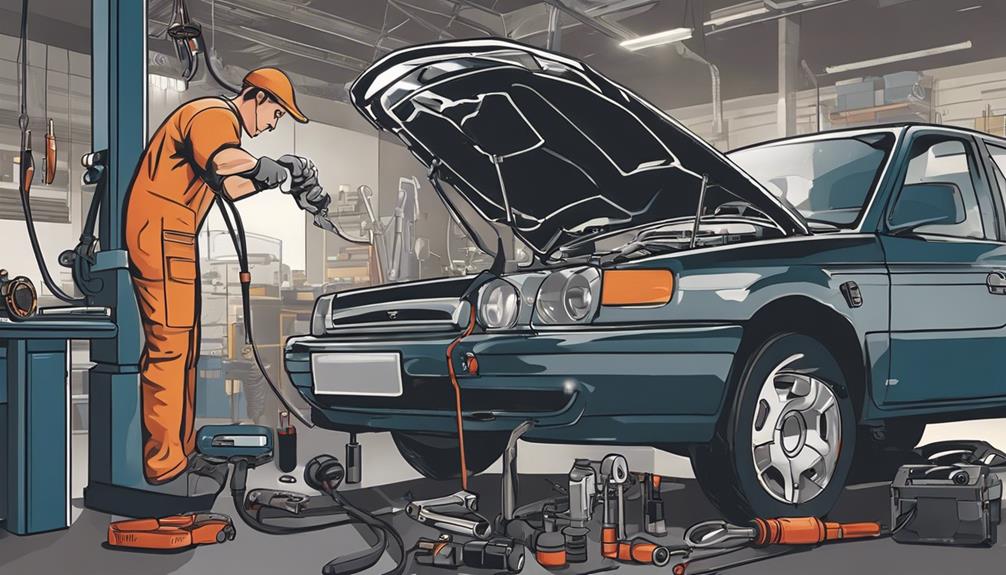Maintaining your vehicle's steering system is essential for top performance, safety, and durability of parts. Routine checks and fluid level monitoring are key for preventing major issues. Detecting signs like wheel vibrations and odd sounds is vital for troubleshooting. Proper alignment and fluid levels boost system efficiency and longevity. Following maintenance practices diligently guarantees peak operation.
Key Takeaways
- Regular steering system maintenance enhances safety and performance.
- Expert inspections and adjustments ensure peak functionality.
- Addressing steering issues promptly prevents major failures.
- Routine fluid checks and component replacements optimize system longevity.
- Professional services by skilled technicians guarantee precise diagnostics and repairs.
Importance of Steering System Maintenance
Effective steering system maintenance is crucial to guarantee excellent performance, safety, and alignment of vehicles in Brownsville, TX. Ensuring system efficiency requires adherence to safety precautions and regular maintenance practices. By conducting routine inspections, checking fluid levels, and addressing any issues promptly, drivers can prevent major failures and costly repairs. Safety precautions should include monitoring steering wheel vibrations, unusual noises, and difficulty turning, as these may indicate underlying problems. Maintaining proper alignment and fluid levels not only enhances system efficiency but also extends the lifespan of steering components. By staying proactive with maintenance schedules and addressing any concerns promptly, drivers can maximize safety, performance, and the longevity of their vehicle's steering system.
Signs of Steering System Issues
Ensuring the proper functioning of a vehicle's steering system requires vigilant monitoring for key indicators of potential issues. Common symptoms signaling steering system problems include steering wheel vibration, difficulty turning, and unusual noises during operation. Troubleshooting techniques involve checking for fluid spots, clunking noises, uneven tire wear, and steering looseness. Regularly replacing power steering fluid is vital to prevent leaks and ensure seal life. Neglecting these signs can compromise safety, lead to alignment issues, reduce driving comfort, and result in costly repairs. Addressing these symptoms promptly is essential for maintaining peak vehicle performance and longevity. By staying proactive and attentive to these warning signs, drivers can prevent major steering system failures and enhance overall driving experience.
DIY Maintenance Tips

Regularly inspecting power steering fluid levels and condition is essential for maintaining proper lubrication in your vehicle's steering system. Check fluid levels frequently and make sure there are no signs of contamination or debris. Additionally, inspect components such as hoses, belts, and the power steering pump for any leaks, damages, or unusual noises. Promptly address any issues to prevent further damage to the steering system. Replace any worn components to maintain peak functionality. Keeping the steering system aligned and balanced is vital to prevent uneven tire wear, which can impact handling and safety. Following manufacturer recommendations for lubrication will help extend the lifespan of your steering system and ensure smooth operation.
Tire Care and Steering System
Proper care and maintenance of tires play a critical role in ensuring the best performance and longevity of the steering system in your vehicle. Tire rotation is essential to prevent uneven wear, which can lead to steering issues affecting handling and safety. Balancing tires and ensuring proper alignment are key alignment tips to maintain a healthy steering system. Regular rotation and balancing help optimize steering system condition, supporting a smoother and safer driving experience. By keeping tires in good condition, you not only enhance performance but also contribute to the overall well-being of your steering system. Following these practices diligently will aid in the longevity and efficiency of your vehicle's steering system.
Professional Maintenance Services

Maintenance of the steering system through professional services involves thorough inspections and precise adjustments by expert technicians to guarantee peak functionality and performance. Expert diagnostics play an important role in identifying underlying issues accurately. These professionals conduct detailed assessments to pinpoint problems affecting the steering system. Precision adjustments are then made to ensure best operation and alignment. By entrusting your vehicle to skilled technicians, you can rest assured that any steering issues will be effectively diagnosed and addressed. Whether it's steering wheel vibrations, fluid leaks, or other concerns, quality repairs are conducted to enhance the driving experience and prevent major failures. Professional maintenance services play a critical role in keeping your steering system in top condition for safe and efficient operation.
Frequently Asked Questions
Can I Use Any Type of Power Steering Fluid for My Vehicle?
When selecting power steering fluid, make sure it is compatible with your vehicle's specifications. Using the wrong type can damage the steering system. Regular maintenance, including fluid checks and replacements, is essential for peak performance and longevity.
How Often Should I Have My Steering System Alignment Checked?
Regularly checking steering wheel alignment is essential for steering system maintenance and safety. Recommended intervals for alignment checks are every 6,000 to 10,000 miles or if you notice steering irregularities. Prioritize these precautions for peak performance.
Is It Normal for My Steering Wheel to Vibrate Occasionally?
Occasional steering wheel vibrations can result from tire balance issues, worn components, or misalignments. To address this, have a professional inspect and rebalance tires, check for worn parts, and realign if needed for smoother handling.
What Are the Common Causes of Power Steering Fluid Leaks?
Power steering fluid leaks commonly stem from preventative maintenance gaps, causing underlying damages. Troubleshooting such issues early can mitigate repair costs and enhance system longevity. Addressing leaks promptly guarantees optimal steering function and safety.
How Do I Know if My Steering System Issues Require Immediate Attention?
Identifying steering system issues necessitating immediate attention involves recognizing warning signs like unusual noises, steering wheel vibrations, or unresponsiveness. Conduct regular maintenance checks, troubleshoot steering system noises promptly, and follow maintenance tips for peak steering wheel responsiveness and safety.